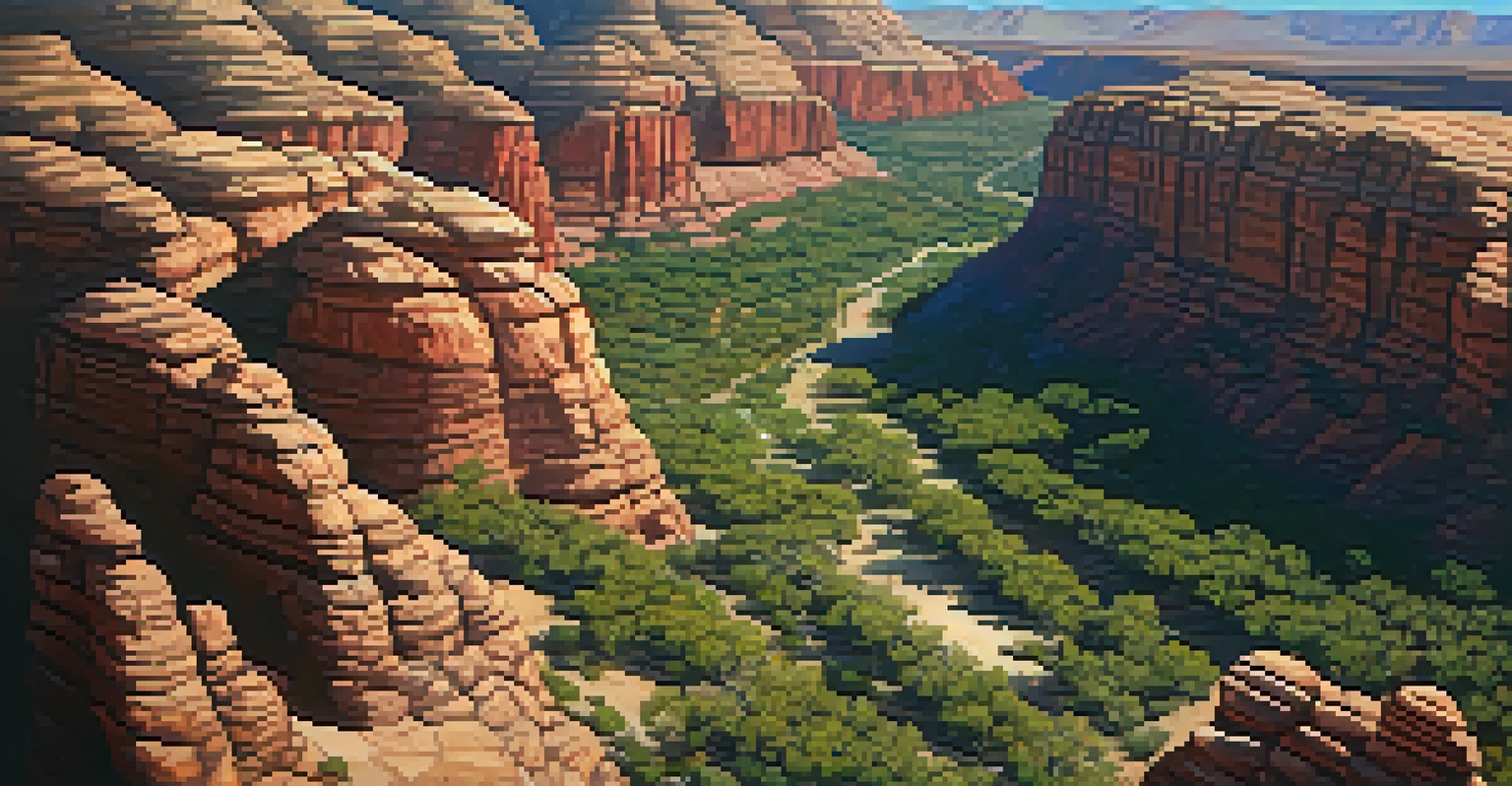The Importance of Preserving Nevada's Natural Habitats

Understanding Nevada's Unique Natural Habitats
Nevada is home to a rich tapestry of natural habitats, from arid deserts to lush wetlands. Each ecosystem supports a variety of wildlife, plants, and microorganisms that thrive in their specific environments. This diversity is not just beautiful; it plays a crucial role in maintaining ecological balance and resilience against environmental changes.
The environment is where we all meet; where we all have a mutual interest; it is the one thing all of us share.
The state features iconic landscapes like the Great Basin and Red Rock Canyon, where unique species such as the desert tortoise and the Lahontan cutthroat trout reside. These habitats are essential for sustaining biodiversity, which directly impacts our air and water quality. Protecting these areas ensures that they remain healthy and vibrant for future generations to enjoy.
Additionally, these ecosystems provide critical services, such as carbon sequestration and flood regulation, which are vital in combating climate change. As we delve into the importance of preserving these habitats, it becomes clear that they are not just places of beauty but essential components of our planet's health.
The Role of Biodiversity in Ecosystem Health
Biodiversity refers to the variety of life forms within a given ecosystem, and it’s a key indicator of environmental health. In Nevada, the interdependence of species creates a web of life that supports everything from pollination to soil fertility. When biodiversity is high, ecosystems are more resilient to disturbances like droughts or invasive species.

For instance, healthy populations of native plants can help prevent soil erosion and provide habitat for various animal species. Conversely, when species are lost, it can create a domino effect, leading to further declines in other populations and the overall health of the ecosystem. This interconnectedness emphasizes why protecting Nevada's natural habitats is crucial.
Biodiversity is Key to Ecosystem Health
High biodiversity ensures ecosystems remain resilient and functional, directly affecting our air and water quality.
By safeguarding these ecosystems, we not only preserve the rich variety of life but also ensure that natural processes continue to function effectively. This is vital for maintaining the balance that supports all living organisms, including humans, who rely on these systems for resources and well-being.
Cultural and Historical Significance of Natural Areas
Nevada's natural habitats are not just ecological treasures; they are also rich in cultural and historical significance. Many indigenous communities have deep ties to the land, viewing it as a source of identity, spirituality, and sustenance. Protecting these areas preserves not only the environment but also the traditions and stories of the people who have lived in harmony with these landscapes for generations.
What we are doing to the forests of the world is but a mirror reflection of what we are doing to ourselves and to one another.
For example, areas like Lake Tahoe and Pyramid Lake are not just stunning natural features but also hold sacred meanings for local tribes. These places offer insights into the historical relationship between people and nature, highlighting the importance of stewardship and respect for the land. By preserving these habitats, we honor cultural heritage and the wisdom of those who came before us.
Moreover, these natural areas serve as outdoor classrooms, allowing us to learn about the history of the land and its inhabitants. They inspire a sense of wonder and appreciation, fostering a connection that can motivate individuals to take action in conservation efforts.
Economic Benefits of Preserving Natural Habitats
While the ecological and cultural importance of Nevada's habitats is clear, their economic value cannot be overlooked. Natural areas attract tourists, contributing significantly to the state’s economy through outdoor recreation and tourism. Activities like hiking, birdwatching, and camping not only provide enjoyment but also generate income for local businesses.
For instance, the stunning vistas of the Sierra Nevada mountains draw visitors from around the world, creating jobs and supporting the economy in surrounding communities. Additionally, healthy ecosystems contribute to industries such as agriculture and fishing, which depend on clean water and fertile land. By preserving these habitats, we ensure that these economic benefits continue for years to come.
Cultural Heritage in Natural Areas
Nevada's natural habitats hold deep cultural significance for indigenous communities, preserving their identity and traditions.
Investing in conservation is not just an environmental responsibility; it is a smart economic strategy. By prioritizing the protection of natural habitats, Nevada can harness their potential to drive sustainable growth and promote a vibrant economy.
Climate Change and Its Impact on Nevada's Ecosystems
Climate change poses significant threats to Nevada's natural habitats, altering weather patterns and disrupting ecosystems. Increased temperatures and changing precipitation levels can lead to habitat loss and increased vulnerability for native species. For instance, as droughts become more frequent, the delicate balance of these ecosystems is challenged, affecting everything from plant growth to animal migration patterns.
Moreover, invasive species often thrive in changing conditions, outcompeting native species for resources. This further stresses the remaining ecosystems and can lead to a decline in biodiversity. Understanding these challenges is crucial for developing effective conservation strategies that mitigate the impacts of climate change.
By prioritizing the preservation of natural habitats, we can create resilient ecosystems that are better equipped to withstand the challenges posed by a changing climate. This proactive approach not only protects wildlife but also supports the communities that rely on these ecosystems for their livelihoods.
Community Involvement in Conservation Efforts
Community engagement is vital in the effort to preserve Nevada's natural habitats. Local residents often have valuable insights and a strong stake in the health of their environment. Initiatives that involve community members in conservation projects, such as habitat restoration or clean-up events, foster a sense of ownership and responsibility toward local ecosystems.
For example, volunteer programs that encourage people to plant native species or remove invasive plants not only benefit the environment but also strengthen community bonds. These activities provide opportunities for education and awareness, helping individuals understand the importance of preserving their natural surroundings.
Economic Gains from Conservation
Protecting natural habitats boosts tourism and supports local economies, making conservation a smart financial strategy.
Encouraging community involvement also amplifies the voices of those who live closest to the land. Their experiences and knowledge can inform better conservation policies and practices that reflect the needs and values of the community, ensuring a more inclusive approach to environmental stewardship.
Future Generations and the Call to Action
Preserving Nevada's natural habitats is not just about protecting what we have today; it's about ensuring a healthy planet for future generations. The actions we take now will shape the world that our children and grandchildren inherit. By prioritizing conservation, we can create a legacy of environmental stewardship that fosters appreciation for nature.
This is a call to action for everyone—individuals, businesses, and policymakers alike. Simple steps, such as reducing waste, supporting local conservation organizations, and advocating for sustainable practices, can make a significant impact. Together, we can cultivate a culture that values and invests in the protection of our natural resources.

As we strive to maintain the delicate balance of our ecosystems, let us remember that each of us plays a role in this vital mission. By working together to preserve Nevada's unique natural habitats, we can ensure that future generations will enjoy the beauty and benefits of a thriving environment.